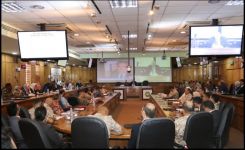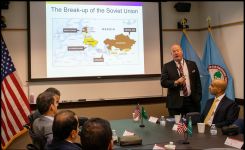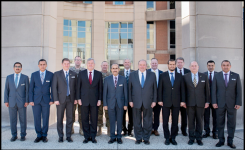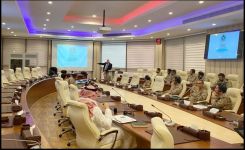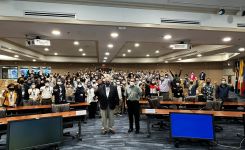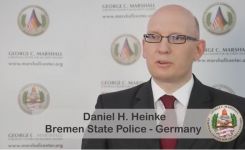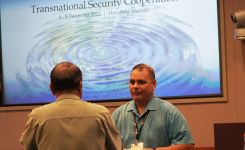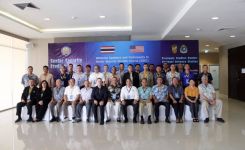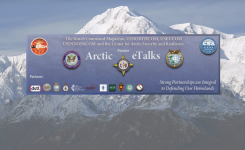Security Studies
Royal Jordanian National Defense College Collaboration with the NESA Center
From 25–27 October 2022, The Near East South Asia (NESA) Center for Strategic Studies hosted a visit by Brigadier General Azzam Irsheid Alrawahneh, the recently appointed Commandant of the Royal Jordanian National Defense College (RJNDC). Brigadier General Alrawahneh was accompanied by the...
Royal Jordanian National Defense College: Perspectives on Strategic Leadership Seminar
From 25–27 July 2022, the NESA Center conducted a Perspectives on Strategic Leadership seminar with students and faculty of the Royal Jordanian National Defense College (RJNDC) in Amman, Jordan. The seminar marked the start of the academic year for the 120 students attending the year-long...
Royal Saudi Air Defense Forces Executive Leadership Program
From 23 September until 7 October 2022 the NESA Center, in partnership with Raytheon, conducted the eighteenth iteration of the Royal Saudi Air Defense Forces (RSADF) Executive Leadership Program. As in other programs, this course brings senior military officers (all on this specific program...

RSBGSA WG meeting, November 5 -8 2010, Reichenau Austria
On invitation of the Austrian MoD, this year’s annual planning workshop of the RSGBSA WG convened in Reichenau, Austria from 5th to 8th November 2010. Twenty experts attended from Armenia, Austria, Bulgaria, Georgia, Germany, Romania, Turkey, Ukraine, USA and NATO. After a review of past...
SARS-COV-2 Mutations, Variants, and National Security
“SARS-COV-2 Mutations, Variants, and National Security,” is the title of a paper by Dr. Deon Canyon, Dr. Sebastian Kevany and retired Rear Adm. Michael S. Baker forSecurity Nexus. This article explains how COVID-19 mutations emerge, and how governments would be potentially remiss in turning...
Saudi Arabia National Defense University Executive Seminar
On March 14–25, 2022, the Near East South Asia (NESA) Center for Strategic Studies, led by Lieutenant General (Ret.) Terry Wolff, NESA Director, hosted the Saudi Arabia Ministry of Defense Armed Forces Command and Staff College (AFCSC). LTG (Ret.) Wolff welcomed Major General Mohammed J....
Saudi Ministry of Defense Conflict Termination Workshop
From 23–27 October 2022, the NESA Center conducted a mobile training team course of instruction on conflict termination on conflict termination theory, negotiations theory, and case studies for the Saudi Ministry of Defense (MOD). The week-long workshop was held in Riyadh, KSA. The Saudis are...
SEAPOC Concludes with 38 Alumni
Thirty-eight Fellows completed the Senior Executive Asia-Pacific Orientation Course (SEAPOC) 14-2 at the Asia-Pacific Center for Security Studies Oct. 9. The course is comprised of senior military members and civilians serving in security-related positions, to include diplomatic or defense...
Secretary of the Navy Carlos Del Toro Speaks to the Fellows of CSC 22-2
On Monday, June 13, Secretary of the Navy Carlos Del Toro spoke to the Fellows attending Comprehensive Security Cooperation Course 22-2 at the Daniel K. Inouye Asia Pacific Center for Security Studies. For Del Toro, the chance to engage with the diversity of international Fellows provided...
Security & Energy In The Mediterranean Sea Roundtable
March 22, 2021 – The NESA Center held a roundtable discussion on the Mediterranean Sea. Scholars from universities and think-tanks from Libya, Egypt, Israel, Cyprus, Greece, and Turkey were invited. The first panel focused on recent developments in Libya and the interim government’s efforts to...
Security Implications of Mass Returning Migrant Workers Due to COVID-19 Crisis
Security Implications of Mass Returning Migrant Workers Due to COVID-19 Crisis Abstract: The issue of mass returning migrant workers has broad implications for human, national and regional security domains that go well beyond increasing unemployment. This paper reports on the complex web...
Security Insights Author Discusses Foreign Terrorist Fighter Research
LTC (Res) Dr. Daniel H. Heinke, German Armed Forces Reserve, and Director, State Bureau of Investigation, Germany's Bremen Police published his research on Foreign Terrorist Fighters as a Marshall Center Insights Paper. He talks more about his research in this interview. You can find his...

Security issues and regional stability in Africa: the experience of Burkina Faso in conflict mediation, prevention and management.
impact on us.” Download the Presentation View Photos of this event Watch Video of this event Listen to Podcast (Audio-only)

Security Leaders Briefed on New U.S. Africa Strategy at Africa Center Seminar
WASHINGTON, D.C. – The Africa Center for Strategic Studies (ACSS) opened its annual Senior Leaders Seminar on June 18, 2012, in Arlington, Virginia, during which keynote speaker Amanda J. Dory, the Deputy Assistant Secretary of Defense for Africa Policy, for the first time in public discussed...

Security, stability highlight PfP Consortium’s 14th conference
TBILISI, Georgia – Promoting security and stability in the South Caucasus and Central Asia was the topic of the Partnership for Peace Consortium 14th annual conference June 19-20 in Tbilisi. Co-organized by the Georgian Ministry of Defense, the conference provided a forum for about...
Senior Executive Seminar: Climate Change and Security
From 14–18 November 2022, the Near East South Asia Center (NESA) hosted a Senior Executive Seminar (SES) titled “Climate Change and Security.” The seminar started with a welcome and introduction from Course Director Dr. Gawdat Bahgat and then a welcome from Acting Director COL David Lamm, USA...
Senior Executive Seminar: Global & Regional Power Competition
From 15-19 November 2021, the Near East South Asia Center (NESA) hosted a virtual Senior Executive Seminar titled “Global and Regional Power Competition.” The seminar started off with welcomes from Course Director Dr. Michael Sharnoff, NESA Center Academic Dean Dr. Roger Kangas, and NESA...
Senior Leaders Gain a ‘Holistic View’ of the Region at TSC 22-2
The Daniel K. Inouye Asia Pacific Center for Security recently graduated 28 Fellows from the Transnational Security Course (TSC) 22-2, closing out the Center’s slate of course offerings for the 2022 calendar year. Amongst the TSC 22-2 participants, five Fellows represented Pacific Island...
Senior Security Studies Course
(THAILAND) On November 18, 2019, the Royal Thai Armed Forces’ Strategic Studies Center of the National Defence Studies Institute began their inaugural Senior Security Studies Course in Bangsaen, Chonburi. The intensive one-week course for senior Thai security sector leaders emphasizes the...
September 2021 presentation on "China: Information and Influence" with Dr. Camilla T.N. Sørensen and Dr. Marc Lanteigne
The September 2021 Arctic Academic eTalks presentation on "China: Information and Influence" with Dr. Camilla T.N. Sørensen and Dr. Marc Lanteigne is happening on Friday September 17th, 2021 at 0800 AK/ 1000 MT/ 1200 EST/ 1800 CET. The Arctic Academic eTalks is an academically-focused...
Páginas
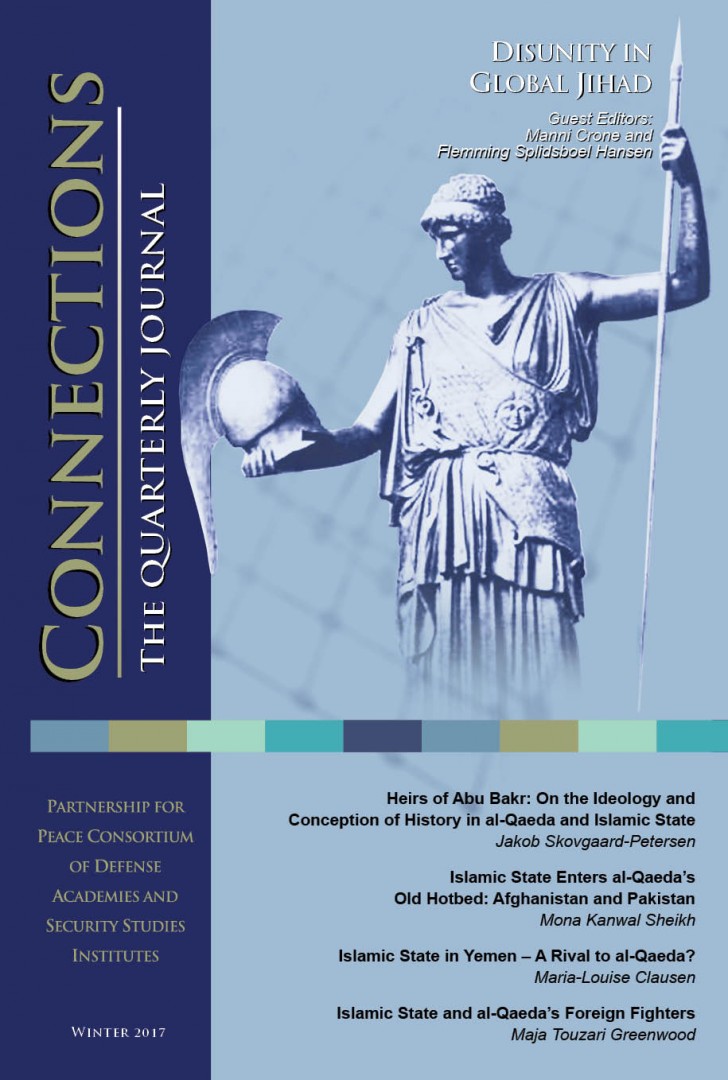
Heirs of Abu Bakr: On the Ideology and Conception of History in al-Qaeda and Islamic State
This article investigates references to early Muslim history by al-Qaeda and Islamic State, and notes a remarkable difference. While al-Qaeda has traditionally referred to the battles of the early Muslims during the time of the prophet Muhammad, the Islamic State centers its references on the...

Islamic State Enters Al-Qaeda’s Old Hotbed: Afghanistan and Pakistan
The Islamic State (IS) movement has opened a new chapter in the Afpak region, changing the landscape of militant movements in the area. This article looks at the patterns of rivalry and collaboration between the Islamic State on one side and Al-Qaeda and Taliban-related movements on the other. It...

Islamic State in Yemen – A Rival to al-Qaeda?
The Yemeni state has all but collapsed as the political transition that followed the popular protests in 2011 has been derailed. This has left Yemen without a functioning central government and thus provided a ripe context for the expansion of both al-Qaeda in the Arabian Peninsula (AQAP) and...

Islamic State’s Incursion into North Africa and Sahel: A Threat to al-Qaeda?
The article examines Islamic State’s expansion into North Africa and Sahel and the subsequent rivalry between Islamic State and Al-Qaeda in the Islamic Maghreb − the regional Al Qaeda group. Although IS managed to establish a province in Libya from 2014 through 2016, its presence in North Africa...

Jihad in Russian
While Russia’s military involvement in the war in Syria has received great attention, less focus has been directed at the foreign fighters from Russia and other post-Soviet states who have joined the Islamic State and other Jihadist groups. The emergence of these Jihadists has been a gradual...

Islamic State and al-Qaeda’s Foreign Fighters
This article reviews important differences in how Islamic State, Jabhat al-Nusra and Ahrar al-Sham perceive the role of the foreign fighter and outlines local dilemmas integrating foreign fighters entails for the three movements. It shows how, in addition to boosting fighting capacity, a high...

Migrants, Housewives, Warriors or Sex Slaves: AQ’s and the Islamic State’s Perspectives on Women
Why do young Muslim women from the whole world join the Islamic State (IS) in Syria and Iraq, despite the fact that the group is notorious for conducting terrible sexual violations against women? Through comparing how al-Qaeda (AQ) and IS are positioning women in their ideological literature, this...

The Prospects of Azerbaijan to Enhance Military Interoperability with NATO
After the end of the Cold War, NATO recognized the importance of extending far beyond its traditional borders in order to maintain peace and stability throughout Europe. The incorporation of new members into the Alliance came to the fore. In the light of this approach, cooperation with partner...

El ALBA, los Asuntos Militares y la Seguridad Regional
En América Latina, hasta el año 2015 estaba vigente un hondo debate académico y político, respecto de la fractura en dos de la región. Un bloque que colinda con el Atlántico, representado por Brasil, Argentina y Venezuela, desconfiaba de la globalización, otorgaba al Estado un papel de alta...

Russia and Montenegro: How and Why a Centuries’ Old Relationship Ruptured
By the end of 2016 Montenegro and America were experiencing some similar problems. Numerous accusations by politicians included the fact that the elections were irregular; Presidential in US and Parliamentarian in Montenegro. Both Montenegro and the USA may have experienced Russian meddling in...

Georgia and Ukraine in the Kremlin’s Policy
The Russian Federation believes that the post-Soviet region is strategically important and considers it to be the exclusive zone of its influence. Each of the former republics occupies a specific place in its foreign and security policy. In the following article the author has made an attempt to...

Understanding Cross-Border Conflict in Post-Soviet Central Asia: The Case of Kyrgyzstan and Tajikistan
Despite the prevalence of works on the ‘discourses of danger’ in the Ferghana Valley, which re-invented post-Soviet Central Asia as a site of intervention, the literature on the conflict potential in the cross-border areas of Kyrgyzstan and Tajikistan is fairly limited. Yet, the number of small-...

Understanding Cross-Border Conflict in Post-Soviet Central Asia: The Case of Kyrgyzstan and Tajikistan
Despite the prevalence of works on the ‘discourses of danger’ in the Ferghana Valley, which re-invented post-Soviet Central Asia as a site of intervention, the literature on the conflict potential in the cross-border areas of Kyrgyzstan and Tajikistan is fairly limited. Yet, the number of small-...

Blending New-generation Warfare and Soft Power: Hybrid Dimensions of Russia-Bulgaria Relations
In order to effectively counter hybrid warfare, it is necessary to understand it. However, certain aspects of hybrid warfare are often confused with traditional soft power. This article aims to highlight the differences between the two by analyzing the relationship between Bulgaria and Russia. The...

Russia’s Digital Awakening
Since the fall of the Soviet Union, Russia has been unprecedented in its embrace of modern technology for the execution of its foreign policy and intelligence operation. This article examines Russia’s relationship to the internet and computer technology, beginning with the early 1990s and detailing...

The Age of Post-Truth: State Influence and Strategic Communication - Contemporary Security Challenges on Europe’s Eastern Flank
The role of strategic communication has changed in the context of Russia’s relations with its partners, including the West, the post-Soviet space and the Western Balkans since 2013 with the declaration of the close integration of communication with other means of Russian influence. Moscow has...

The importance of the Council of Europe’s 24/7 Network of Contact Points on Foreign Terrorist Fighters
The article focusses on the Council of Europe 24/7 Network of Contact Points on Foreign Terrorist Fighters envisaged in article 7 of the Additional Protocol to the Council of Europe Convention on the Prevention of Terrorism adopted on 22 October 2015. The Protocol supplements the 2005 Council of...

Armenia and the South Caucasus: A New Security Environment
This article seeks to examine through a realist international relations’ lens the geopolitics and the security environment of the South Caucasus, and specifically the security challenges Armenia will face over the next five years. As the South Caucasus is cemented by collective security agreements...


